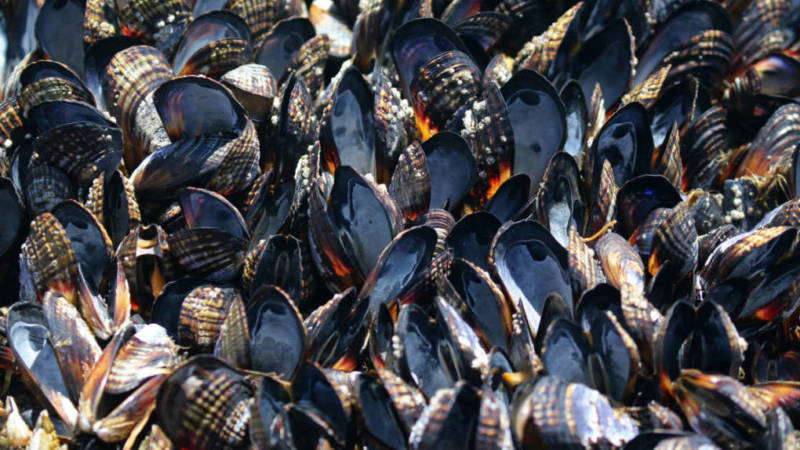Sones, who wrote about the mussel die-off on her blog, spoke with KQED Host Mina Kim on the “Forum” radio program Wednesday. They were joined by Eric Simons, digital editor of Bay Nature magazine, who wrote that the June heat wave cooked the mussels in place.
Below are excerpts of Sones’ and Simons’ answers, edited for length and clarity.
Do you know when this happened?
Jackie Sones: It’s likely that it was that June 9-11 period. The air temperatures were far above normal. It was over 20 or 25 degrees higher than normal for that time of year. We believe that that those higher temperatures, combined with mid-day low tides, contributed to the mortalities.
How is it that that air temperature, about 75 degrees or so, was able to affect these mussels so badly?
Eric Simons: It’s not really the air temperature; it’s the temperature of the rock, the surface they’re on. On a 75-degree day, the rock can be 100 degrees or 105 degrees and the mussels are trying to vent that hot air; they’re trying to to get rid of it, but the seabreeze we usually get was gone. They just sit and they cook.
Don’t mussels have a way of dealing with this? There are hotter months than June for the coast.
JS: We see quite warm air temperatures in late summer and early fall. However, the timing of the low tides is different [stranding them out of water]. And also there is some aspect to this that might be related to the shock of an extreme-heat day, where there’s nothing leading up to that and all of a sudden you just have a super-high temperature and the animals aren’t prepared for it.
Do we know the geographic extent of the die-off?
ES: There was a study going on for quite a while where they had sensors out in the mussel beds to track the temperatures up and down the West Coast. That study ran out of money two years ago. It’s fortunate even that that Jackie was out and noticed and saw this — it takes observers who are out and are paying attention and know what they’re seeing.
How important are mussels to the marine ecosystem?
JS: Mussels are amazing. They’re a very important foundation species. That’s similar to the trees in the forest, or kelp in a kelp forest, or corals for a coral reef. These animals provide a lot of habitat and shelter for many different animals. In the case of mussel beds, if you look at one particular site you might find over 300 different species living within the mussel bed. So they’re a critical species along the shoreline.
Was the June heat wave a result of climate change?
ES: It makes it more likely, certainly. You have this bad luck event, the low tide was during the middle of the day, when it was really hot outside and that that’s what baked them and killed them. These are animals that if this happened some other time when the low tide was at four in the morning it wouldn’t have been a problem. Climate change makes it more likely that you get heat waves earlier, even in March and in April.
